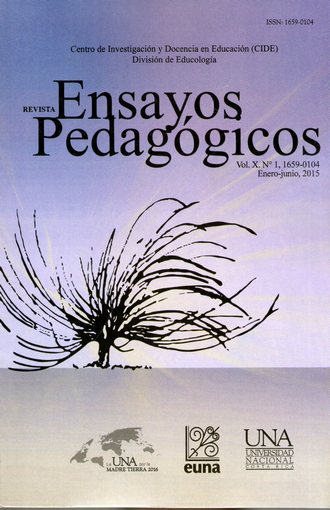The Technological Profile of a Language Teacher in Mexico: A Revision of Standards
DOI:
https://doi.org/10.15359/rep.10-1.7Keywords:
standards, ICT, teacher, education, English language, MexicoAbstract
Standardization is a process that has been increasing in the past years because of globalization. English Language Teaching is ruled by standardization and uniformization of processes and knowledge. It is possible to find topics related to Information and Communication Technologies (ICT) among these knowledge and processes. Nevertheless, measuring different contexts with different conditions with the same considerations is a process that many consider incorrect. In this paper, a selection of international standards regarding ICT in English Language Teaching is proposed. First, background of the Mexican context is presented. Next, the process of comparison and the description of the selected literature is shown. Finally, a suggestion of adequate standards for the Mexican context is presented.
References
Alarcón, E. y Ortiz, V. (2014). Estudiantes, profesores y TIC. La investigación en México. En A. Ramírez y M.A., Casillas Háblame de TIC (pp. 39-70). Córdoba, Argentina: Editorial Brujas.
Ander-Egg, E. (1995) Técnicas de investigación social. Buenos Aires, Argentina: Editorial Lumen.
Brünner, J.J. (2003). Educación e internet. ¿La próxima revolución? Chile: Fondo de Cultura Económica.
Cambridge English. (2014a). Cambridge English Teaching framework - How and why the Teaching Framework was developed. Recuperado de http://www.cambridgeenglish.org/teaching-english/cambridge-english-teaching-framework/
Cambridge English. (2014b). Cambridge English Teaching framework - Categories and components. Recuperado de http://www.cambridgeenglish.org/teaching-english/cambridge-english-teaching-framework/
Cambridge English. (2014c). Cambridge English Teaching framework – Full level descriptors. Recuperado de http://www.cambridgeenglish.org/teaching-english/cambridge-english-teaching-framework/
Carney, N. y Foss, P. (2008). Student-produced video: two approaches. English Teaching Forum, 46 (2), pp. 14-19.
Castells, M. (1999). La era de la información: economía, sociedad y cultura. Volumen I: La sociedad red. México, D.F: Siglo Veintiuno.
Chapelle, C.A. (2001). Computers applications in second language acquisition. Foundations for teaching, testing and research. Cambridge, UK: Cambridge University Press.
Clark, B. (1983). El sistema de educación superior. Una visión comparativa de la organización académica. México: Nueva Imagen.
Crovi, D. (2009) Acceso, uso y apropiación de las TIC en comunidades académicas. 1ra Ed. México, D.F.: UNAM
Garrett, N. (2009) Computer-Assisted Language Learning Trends and Issues Revisited: Integrating Innovation. The Modern Language Journal, 93, pp. 719-740.
Garza, A. (2004). Manual de técnicas de investigación para estudiantes de ciencias sociales. México: El Colegio de México.
Gordo, A. y Serrano, A. (2008). Estrategias y prácticas cualitativas de investigación social. Madrid, España: Pearson Educación.
Gruba, P. y Hinkelman, D. (2012). Blending technologies in second language classrooms. New York, NY: Palgrave Macmillan.
Harmer, J. (2001). The practice of English language teaching. Malasia: Pearson Education Limited.
Healey, D. y Hubbard, P. (s.f.) Introducing the New TESOL Technology Standards.
Keats, D. (1992). La entrevista perfecta. México, D.F.: Editorial Pax México.
Mishler, E.G. (1991). Representing discourse: the rethoric of transcription. Journal of narrative and life history, 1 (4), pp. 255-280.
Murphy-Judy, K. y Youngs, B.L. (2006). Technology standards for teacher education, credentialing and certification. En M. Levy y P. Hubbard (Eds.), Teacher education in CALL (pp. 45-60). Amsterdam, Holanda: John Benjamins Publishing Company.
National Council of Teacher of English NCTE. (1996). Standards for the English Language arts. Recuperado de http://www.ncte.org/standards/ncte-ira
O'Donoghue, M. (2014) Producing video for teaching and learning: a framework for planning and collaboration. Nueva York, EUA: Routledge.
Piper, A. (1987). Helping learners to write: a role for the word processor. ELT Journal, 41 (2), pp. 119-125.
Ramírez-Martinell, A., Casillas, M.A. y Contreras, C.C., (2014). La incorporación de las TIC a la enseñanza universitaria de los idiomas. Debate Universitario, 5 (noviembre 2014), pp. 123-138.
Ravitch, D. (1995). National standards in American education: a citizen's guide. Washington, D.C: Brookings
Richards, J.C. (2008). Growing up with TESOL. English language forum, 46 (1), pp. 2-11.
Richards, J.C. (2011). Competence and performance in language teaching. Nueva York, EUA: Cambridge University Press.
Richards, J.C. y Farrell, T.S.C. (2005). Professional development for language teachers. Nueva York, EUA: Cambridge University Press
Rodarte, R. (2014). Las tecnologías de la información y la comunicación en la educación musical: Compilaciones en el aula. En A. Ramírez y M.A. Casillas Háblame de TIC (pp. 135-156). Córdoba, Argentina: Editorial Brujas.
Sabino, C. (1992). El proceso de investigación. Caracas, Venezuela: Panapo.
Salsbury, T. y Crummer, C. (2008). Using teacher-developed corpora in the CBI classroom. English Teaching Forum, 46 (2), pp. 28-37.
SEP (2011a) Programa Nacional de Inglés en Educación Básica PNIEB - Fundamentos curriculares - Fase de expansión
SEP (2011b) Programa Nacional de Inglés en Educación Básica PNIEB - Programas de estudio 2011 Ciclo 4
SEP (s.f.) Perfiles de docentes y asesores técnico-pedagógicos para la asignatura de inglés en educacioón baásica
TESOL. (2008). TESOL Technology Standards Framework. Retrieved from http://www.tesol.org/docs/books/bk_technologystandards_framework_721.pdf
Toffler, A. (1980). La tercera ola. Barcelona, España: Plaza y Janés Editores.
Universidad de Southampton. (s.f.) European profile for language teacher education - A frame of reference.
Wells, S. (2010). Technology, genre, and gender. The case of power structure research. En S.A. Selber (Ed.), Rethorics and technologies. New directions in writing and communications. Columbia, EUA: University of South Carolina Press.
Downloads
Published
How to Cite
Issue
Section
License
Ensayos Pedagógicos is subscribed to the Attribution-NonCommertial-NoDerivatives 4.0 International Creative Commons Licence, which allows both authors and readers to freely download, store, copy, and distribute the final approved publisehd version of the manuscript (post-print) as long as this is done without commercial purposes, no derivative works are generated, and the source and author are mentioned. As well, Ensayos Pedagógicos declares that authors will remain the rightful owners of the copyrights of their work in perpetuity.







